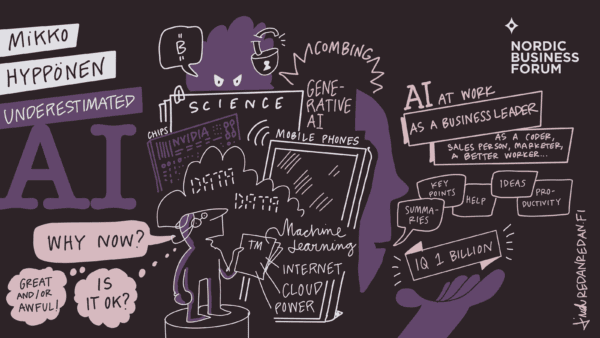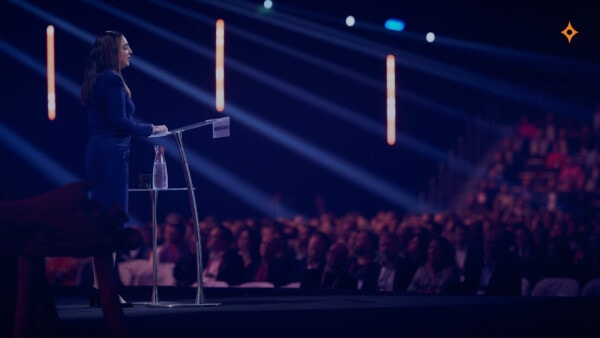11Oct2023
Mikko Hyppönen has always had an interest in new technologies. In 1983, when he was 13 years old, he picked up the fourth issue of the finnish magazine Tekniikan Maailma (“The World of Technology”), which already was reporting on the potential of machine-learning tools and artificial intelligence. For the next 40 years, AI was something that was discussed but never seemed to materialize, Mikko, now a computer security expert, told attendees at this year’s Nordic Business Forum.
Until, over the past two years, it finally did. “The forecasts they made in this 40-year-old magazine were fairly accurate,” he said. “They spoke about how one day we would have the capability of teaching these massively large systems and that they would become intelligent.”
The AI Revolution
Mikko is currently the chief research officer for WithSecure and the principal research advisor at F-Secure, both cybersecurity firms. AI, he said, is a technology revolution. And like all technology revolutions, it has both good and bad sides.
The AI revolution has been supported by three other advancements, according to Mikko. The first was the creation of the internet, which allowed the digitization of data that, in turn, has been used for machine learning. “Machine learning can be so much more powerful because we have things to teach these algorithms,” he said.
Accompanying this explosion in internet-supported data was an expansion in data storage thanks to cloud computing. “All human knowledge is data, and we can store it and keep it online,” he said.
The third advancement has been in computing power. Mikko described that the average computing power in a smartphone today would have been considered a major innovation just two decades ago. “It’s like magic, the fact that we have supercomputers in our pockets and the fact that we humans are capable of building this,” he said.
A final piece of the puzzle has been breakthroughs in research. He cited a 2017 paper called “Attention Is All You Need” as a seminal work that has led to the introduction of AI.
Enter Generative AI
This expansion of the attention of machine-learning algorithms led to the creation of generative AI. In his talk, Mikko demonstrated that with generative AI, he was able to create an image of Batman walking the snowy streets of Helsinki or to pair Johnny Cash’s country classic “Folsom Prison Blues” with Aqua’s 1997 hit “Barbie Girl.” But the ability to do that also raises ethical questions. Is it ethical to create new songs combining the work of other artists? Or to make fake images?
“Clearly, we are benefitting from this revolution,” said Mikko. “But the materials that have been used to teach them? That’s a little bit muddy.” Prohibition of AI is not the solution, he said. But discussions are necessary.
Companies, nevertheless, are going to need to adopt AI, and many, from Google to Meta to TikTok, are already reaping its benefits, mostly via recommendation engines built into Instagram or YouTube, which can keep a user hooked, looking at content for hours on end. “They keep you glued to your screen because their algorithms learn what you like,” Mikko said. “It’s turning us all into slaves and doom scrollers but also generating massive amounts of money for these companies.”
Ignore AI at Your Own Risk
Companies may debate the best ways to make use of AI, but Mikko warned them that by not adopting AI early enough, they will have the same fate as companies that ignored the internet revolution. He gave positive examples of firms that have developed services that write email openers for potential clients in different languages, while another looks for anomalies in real-life network traffic, such as why a person might take an unusual route to the office on a certain day.
“It might not mean that there’s something criminal or bad going on, but they do notice if something weird is going on,” Mikko remarked. “These are very powerful technologies.”
Mikko suggested that attendees could make use of such technologies by using them to learn more. He said that he uses an application called Claude.ai to summarize research papers and has even given the app a test drive by requesting summaries of his own papers to see if it works. “How good are the summaries? They are perfect,” he said, and can be produced in different languages.
Beware of Deep Fakes
There are downsides, of course. Mikko said that there have been rogue versions of generative AI, and that bad actors have been using them to write phishing emails and malware. There also have been money-making deep fakes created using generative AI. Mikko suggested that there could be scams where a company’s CFO could get a fake call from a chairman or CEO asking for account information or to add a new client to the database. “It’s quite clear the technology exists, and if it hasn’t happened yet, it will,” said Mikko.
Interestingly, having an AI that can probe a system’s vulnerabilities is also an opportunity to build stronger systems. “It’s great when you are trying to find security vulnerabilities from your own code from your own product so you can fix them,” said Mikko. “But it’s awful when someone else is using this technology to find security vulnerabilities from your code.” According to Mikko, though, that’s just how things are with all technology revolutions.

Visual summary of Mikko Hyppönen’s keynote by Linda Saukko-Rauta
Want to get the full summary of the Nordic Business Forum 2023 speeches + extra content for reflecting on your learning? Download your free copy of the full Executive Summary and summaries from previous events!


